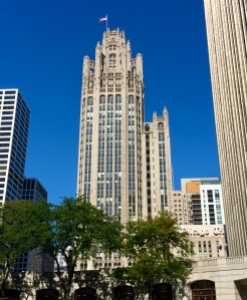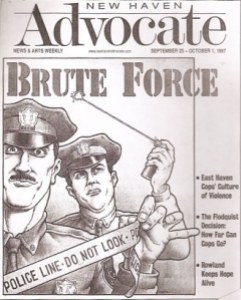
An increasing number of news organizations are becoming fearful in the face of a rising tide of fascism. The Washington Post today joined the Los Angeles Times in deciding not to endorse in the presidential contest between Kamala Harris and Donald Trump. David Folkenflik of NPR reports:
The editorial page editor, David Shipley, told colleagues that the Post’s publisher, Will Lewis, would publish a note to readers online early Friday afternoon.
Shipley told colleagues the editorial board was told yesterday by management that there would not be an endorsement. He added that he “owns” this decision. The reason he cited was to create “independent space” where the newspaper does not tell people for whom to vote.
As with the LA Times, there has been no change in ownership at the Post, and both papers routinely have endorsed Democratic candidates in the past. The Post’s billionaire owner, Jeff Bezos, courageously stood up to Trump in the face of threats during Trump’s rise in 2015 and ’16 and throughout his presidency. But the Post has been adrift in recent years, and the Bezos of 2018 is clearly not the Bezos of 2024.
In CNN’s “Reliable Sources” newsletter, Brian Stelter cites the historian Timothy Snyder’s warning about “anticipatory obedience,” quoting Snyder as writing that “most of the power of authoritarianism is freely given.” That appears to be what has happened with Bezos and LA Times owner Patrick Soon-Shiong.
Now, it’s true that the very notion of newspaper endorsements may have had their day. Newspaper chains such as Alden Global Capital and Gannett have moved away from them. The New York Times, weirdly, has given up on state and local endorsements, where the editorial board’s views might be welcome, while continuing to endorse in national races. Nonprofit news outlets can’t endorse without losing their tax exemption.
But for the LA Times and the Post to take a pass on the presidential race this late in the campaign smacks of giving in to the punishment they might be subjected to if Trump returns to office. Anticipatory obedience, in other words. A thoughtful, considered explanation months ago as to why they were ending endorsements would be another matter, but this is anything but that.
Meanwhile, the Times Union of Albany, New York, part of the Hearst chain, endorsed Harris today, writing:
For all Mr. Trump’s rhetoric about the weaponization of government, it’s Mr. Trump who has threatened to fire thousands of diligent career civil servants, fill the federal workforce with his loyal minions, use the Justice Department to hound political adversaries, and sic the military on citizens who protest against him.
This is not the talk of a person fit to be president for all Americans. On the issues and on character, it’s Ms. Harris who can be entrusted with the power and responsibility of the presidency.
This has been a shameful week for the LA Times and The Washington Post, and now it’s been punctuated by a much smaller paper’s willingness to step into the breach.
Merchants of death
One of the worst consequences of the local news crisis has been the rise of the oxymoronic paid obituary. Sorry, but obits are news stories with journalistic standards. If someone is paying for it, then it’s not an obit, it’s an ad — a death notice, in other words.
Bill Mitchell has a stunning piece up at Poynter Online about the venerable Hartford Courant, now owned by the cost-slashing hedge fund Alden Global Capital. It seems that a respected former staff reporter named Tom Condon died recently — and the Courant, rather than producing its own obit, picked up the one published in CT Mirror, a nonprofit that makes its journalism available for a fee to other news outlets. What’s more, the Courant has now slipped that obit behind a paywall.
The Courant’s website also carried an obit written by the Condon family for Legacy.com, according to Mitchell, who writes:
Paid obits, often written by and paid for by family members, have been boosting the sagging revenues of newspapers for a couple of decades. (The Courant charges about $1,200 for an obit the length of the one submitted by the Condon family, with an extra charge for a photo.) In 2019, Axios reported that more than a million paid obits were producing $500 million annually for newspapers, a small but significant chunk of overall advertising and circulation revenues then totaling about $25 billion a year.
It’s outrageous, and it’s not because newspapers are profiting from death. Rather, charging for obits is fundamentally no different from charging for any other type of news, and it corrupts what is supposed to be a journalistic endeavor.
The Courant and Alden are hardly alone in this. But for the paper to rely on another news organization to cover the death of one of its own really drives home just how far we’ve traveled down a very bad road.
Lessons from Billy Penn
Ten years ago, the digital journalism pioneer Jim Brady launched Billy Penn, a mobile-first news outlet covering Philadelphia. A few months later, I was in Philly to interview Brady and Chris Krewson, Billy Penn’s first editor, for my 2018 book “The Return of the Moguls.”
Billy Penn was eventually acquired by WHYY, Philly’s public radio station. Brady is now vice president of journalism for the Knight Foundation, and Krewson is executive editor of LION (Local Independent Online News) Publishers.
Krewson has written an informative and entertaining piece for LION on “10 things I’ve learned about independent publishing since launching Billy Penn in 2014.” Probably the most important of those lessons is that it took longer for Brady and Krewson to make a go of it than they were able to give — the project finally broken even in 2021, but by then WHYY was in charge.
That remains a problem for today’s start-ups, Krewson writes, although he’s hopeful that new philanthropic efforts such as Press Forward will give them the runway they need to build toward sustainability.






